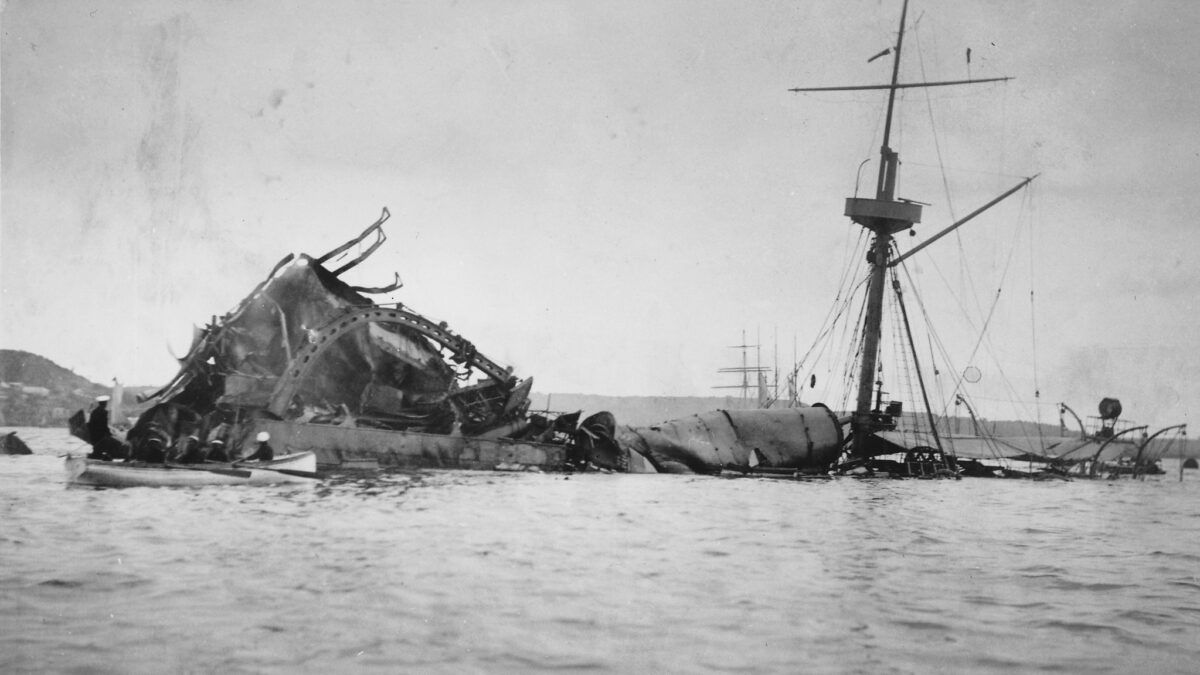The night of Feb. 15, 1898, the U.S. battleship Maine sat at anchor in Havana, Cuba. A few minutes after 9 p.m., the nightly ritual of “Taps” from Fifer C. H. Newton’s bugle descended over the ship. Some half an hour later, the forward end of the ship rose suddenly above the water.
“Along the pier, passersby could hear a rumbling explosion,” detailed author Tom Miller. “Within seconds, another eruption — this one deafening and massive — splintered the bow, sending anything that wasn’t battened down, and most that was, flying more than 200 feet into the air.”
The explosion, which killed more than 250 men on board, was quickly memorialized with cries of “Remember the Maine!” Without directly accusing Spain, which controlled Cuba at the time, a U.S. Naval Court of Inquiry decided a month later that the explosion was from a mine. (A U.S. Navy investigation decades later found it was likely an accidental coal bunker fire.)
Shortly afterward, the United States declared war on Spain, starting the Spanish-American War. One of the biggest warmongering forces in America, capitalizing on the Maine‘s explosion, was the press — a position American media pundits continue to hold as they work overtime to drag Americans into a war with Russia over Ukraine.
When you see talking heads uncritically parroting propagandist stories about Ukraine that turn out to be false, from the “Ghost of Kyiv” to that Snake Island story to old photos taken years ago, you should be asking why the corporate media is so willing to spread such fake news (while it censors conservatives for factual critiques of disproven Covid narratives, no less). It wouldn’t be the first time the press lied to pull Americans into war.
How Newspapermen Helped Start a War in Cuba
It was the so-called golden age of newspapers, after the influence of the Industrial Revolution gave rise to the “penny press” — newspapers you could buy at the street corner without a subscription. Competing magnates like William Randolph Hearst and Joseph Pulitzer fought for readers, and they did so by trying to produce the most sensational news possible.
As the story goes, in the year before the Maine exploded, Hearst had commissioned reporter Frederic Remington to go to Cuba, where Cuban revolutionaries were skirmishing with their Spanish colonizers. When Remington sent Hearst a wire to explain he was leaving Cuba because there was no war to cover, Hearst reportedly replied, “You furnish the pictures and I’ll furnish the war.”
After the sinking of the Maine, headlines like “Spanish Treachery!” and “Destruction of the War Ship Maine Was the Work of an Enemy!” and “Invasion!” and “Who Destroyed the Maine? $50,000 Reward” splashed across front pages. The United States went to war in April, two months after the Maine perished.
The media’s eagerness to gin up a war mirrored the push for involvement from other voices in politics and culture. Some Americans had sympathy for Spanish-owned Cuba as fellow colonial revolutionaries, while others wanted to see U.S. influence and territory expand internationally.
Half a century prior, when the phrase “manifest destiny” was being coined, the United States had gone to war with Mexico over Texas but also ended the war with acquisitions of what is now California, Arizona, Colorado, Nevada, New Mexico, Utah, and Wyoming in the Treaty of Guadalupe Hidalgo. By 1898, the United States had purchased Alaska from Russia and claimed several Pacific islands.
Many Americans saw a similar opportunity for territorial expansion in a fight with Spain over Cuba. Sure enough, the United States exited the Spanish-American War with new acquisitions from Guam to the Philippines to Puerto Rico.
While the warmongers weren’t limited to the press, they were certainly concentrated there. The State Department Office of the Historian writes: “Hearst and Pulitzer devoted more and more attention to the Cuban struggle for independence, at times accentuating the harshness of Spanish rule or the nobility of the revolutionaries, and occasionally printing rousing stories that proved to be false.” Sound familiar?
A Century of Dishonesty
“Remember the Maine!” may have been at the height of the yellow journalism era, but it was certainly not the last instance of dishonest reporting in favor of sensational warmongering. During the Spanish Civil War, which saw Nationalist revolutionaries clash with Republicans in the years directly preceding World War II, some Western outlets were criticized for covering the conflict sensationally. The New York Times devoted far more manpower to the war than papers at the time traditionally did, with “highly partisan” perspectives.
George Orwell, who fought alongside Republican forces, wrote in his memoir “Homage to Catalonia” that “for the first time, I saw newspaper reports which did not bear any relation to the facts, not even the relationship which is implied in an ordinary lie.”
“I saw great battles reported where there had been no fighting, and complete silence where hundreds of men had been killed. I saw troops who had fought bravely denounced as cowards and traitors, and others who had never seen a shot fired hailed as heroes of imaginary victories; and I saw newspapers in London retailing these lies and eager intellectuals building emotional superstructures over events that never happened,” he recalled. “I saw, in fact, history being written not in terms of what happened but of what ought to have happened according to various ‘party lines.’”
Newspaper propagandists’ willingness to cover wars in self-interested ways didn’t always run in the same direction, either. Orwell’s contemporary and fellow writer Ernest Hemingway had similar criticism for propagandist writers who downplayed the carnage of World War I, insisting it was “the most colossal, murderous, mismanaged butchery that has ever taken place on earth. Any writer who said otherwise lied, So the writers either wrote propaganda, shut up, or fought.”
Later in the 20th century, The New York Times’ Berlin bureau chief Guido Enderis was providing friendly coverage of Hitler’s Germany, according to writer Ashley Rindsberg’s book “The Gray Lady Winked.” Meanwhile, the paper’s Moscow correspondent Walter Duranty, Rindsberg noted, was downplaying Joseph Stalin’s role in the 1932-33 famine in Ukraine because “at the time, The New York Times was actively pushing for American recognition of the Soviet Union.” President Franklin Roosevelt obliged, recognizing the USSR in 1933.
A more recent example is that of The New York Times and other corporate media outlets reporting baseless stories about the existence of weapons of mass destruction (WMDs) in Iraq to gin up support for President George W. Bush’s invasion of Iraq in 2003. A year afterward, the Times editors admitted their lopsided reporting on the matter in a lengthy editorial piece.
“We have found a number of instances of coverage that was not as rigorous as it should have been,” they wrote. “In some cases, information that was controversial then, and seems questionable now, was insufficiently qualified or allowed to stand unchallenged.”
“Administration officials now acknowledge that they sometimes fell for misinformation from these [Iraqi] exile sources. So did many news organizations — in particular, this one,” the editors continued. With the rapid dissemination of sensational photos, videos, and information via social media today, there’s no indication the corporate press is any less immune to disinformation when it fits their narrative.
When you see corporate outlets rushing us into war in Europe with sensational stories and flat-out dishonest polling, think twice. The corrupt media has lied to drag Americans into war before, and none of their recent lies on other issues should incline you to think they won’t do it again.









